Academic Integrity Module
| Site: | learnonline |
| Course: | Referencing |
| Book: | Academic Integrity Module |
| Printed by: | Guest user |
| Date: | Friday, 30 January 2026, 2:09 AM |
What is Academic Integrity?
This module has been designed to help you understand UniSA's AB-69 Academic Integrity Policy (University of South Australia, 2023).
Hear from UniSA students on what Academic Integrity means to them and why it's important for your Uni work to be your own, like your fingerprint.
(Video length: 3 minutes, 34 seconds)
The UniSA policy defines Academic integrity as "a commitment to act with honesty, trustworthiness, fairness, respect and responsibility in all academic work, and in professional practice" (University of South Australia, 2023, p. 2). These values guide the behaviour of everyone in the academic world, including students, teachers and scholars.
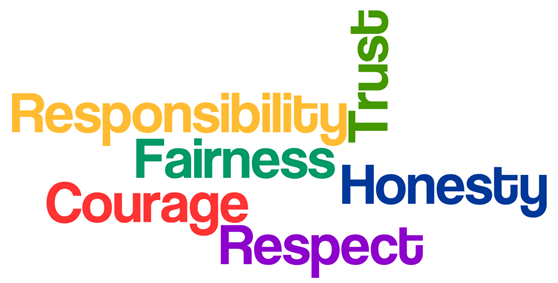
What does Academic Integrity mean in practice?
Academic Integrity includes:
![]() Acknowledging the sources of information and knowledge in your assignments by using a referencing system
Acknowledging the sources of information and knowledge in your assignments by using a referencing system
![]() Paraphrasing other people's work and ideas into your own words while still referencing the source
Paraphrasing other people's work and ideas into your own words while still referencing the source
![]() Completing your own work independently
Completing your own work independently
![]() Behaving honestly in exams, assignments, and other forms of academic work
Behaving honestly in exams, assignments, and other forms of academic work
What is Academic Misconduct?
Academic misconduct occurs when staff or students disregard the values of academic integrity. UniSA's Academic Integrity Policy (University of South Australia, 2023) identifies the different types of academic misconduct, which are explained in more detail in this module.
Some examples include:
 plagiarism (copying work from other sources; not accurately following referencing guidelines)
plagiarism (copying work from other sources; not accurately following referencing guidelines)
 cheating in exams
cheating in exams
 copying or falsifying documents or data
copying or falsifying documents or data
 getting other people to write your work
getting other people to write your work
 doing someone else's work for them
doing someone else's work for them
 collusion (working with other students on assessable work when it's not permitted)
collusion (working with other students on assessable work when it's not permitted)
 contract cheating (paying or getting someone to do your work, or using software or tools to do your work)
contract cheating (paying or getting someone to do your work, or using software or tools to do your work)
 file sharing (e.g. to exchange exam questions or assignments)
file sharing (e.g. to exchange exam questions or assignments)
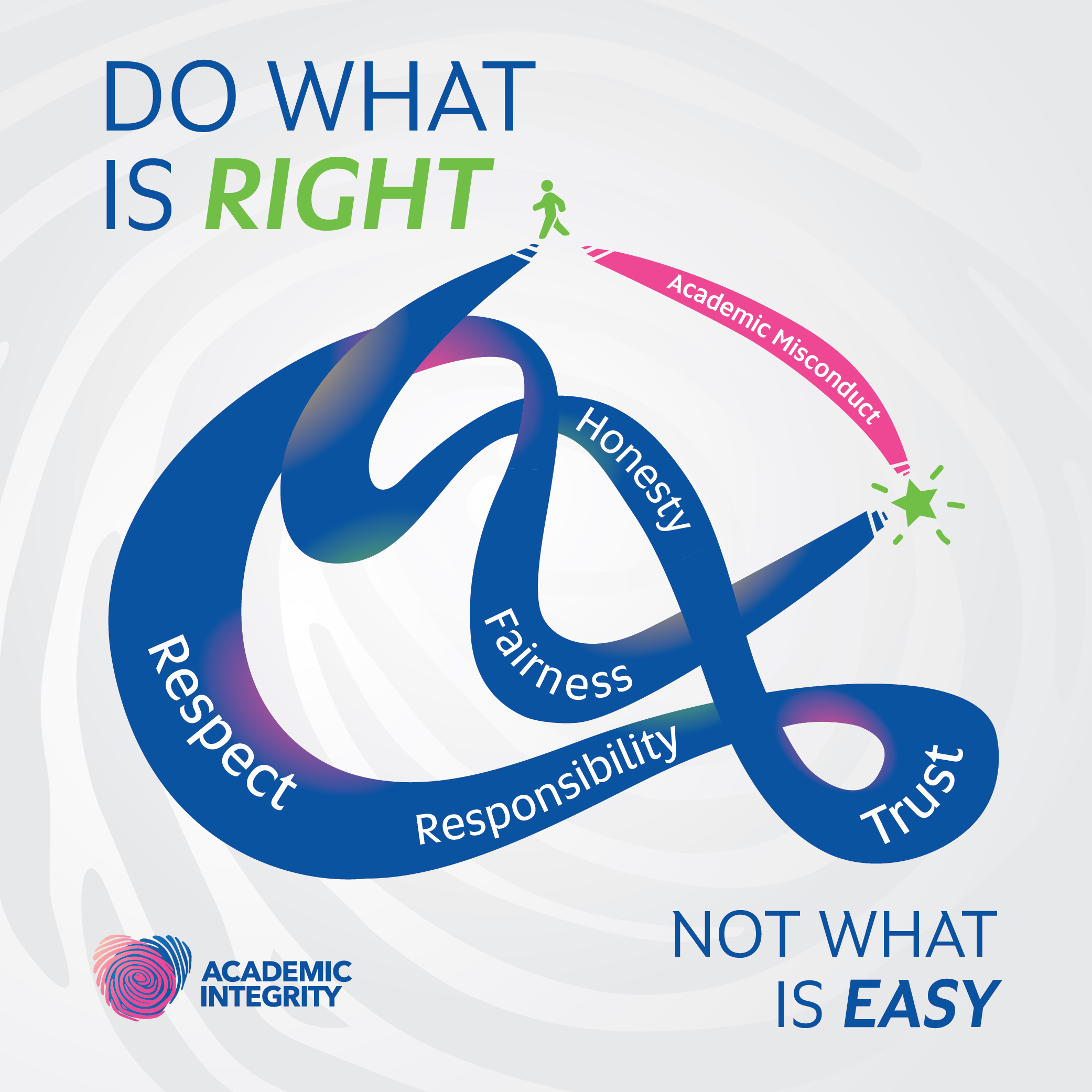
Plagiarism
The Academic Integrity Policy (UniSA, 2023, p. 2) defines plagiarism and failures of correct acknowledgment practice as:- directly copying any material from electronic or print resources without acknowledging the source
- closely paraphrasing sentences or whole passages without referencing the original work
- submitting another student's work in whole or in part
- using another person's ideas, work, or research data without acknowledgment
- appropriating or imitating another’s ideas.
This means, if you include someone else's materials, information, images or ideas in your work, you must acknowledge the original author/creator in both the in-text reference and the reference list. If you do not cite the sources you use, this is considered plagiarism. You should also use your own words (paraphrase) to express their ideas (this shows that you've understood them). If you use their exact words (direct quote) you must put them in quotation marks to show they are being quoted. Some of the practices above may be permitted in specific assessments, but this will always be clearly stated and provided in the Course Outline.
You should therefore:
![]() Include in-text references and
a reference list for material from other sources
Include in-text references and
a reference list for material from other sources
![]() Paraphrase/summarise original
material into your own words to demonstrate understanding and include a reference
Paraphrase/summarise original
material into your own words to demonstrate understanding and include a reference
![]() Submit your own work (unless
where permitted for group assignments).
Submit your own work (unless
where permitted for group assignments).
To learn more about plagiarism, a concept which is the same regardless of what referencing style you use at university, watch this short video.
(Video: 2 minutes, 50 seconds)
Bainbridge State College. (2010, January 6). Plagiarism: How to avoid it [Video]. YouTube. https://www.youtube.com/watch?v=2q0NlWcTq1Y
 Plagiarism: check your understanding
Plagiarism: check your understanding
So, now you know when plagiarism can occur, try the Plagiarism Quiz to check your understanding.
- There are 6 questions in this quiz.
- When you have answered all questions, click 'Finish' to see your result and the correct answers.
- You can attempt the quizzes more than once if you want to practise and improve your understanding.
- If you do not understand the quiz questions and/or answers, book an appointment with a Learning Adviser. Bring your questions and your quiz result to the appointment.
 Paraphrasing: check your understanding
Paraphrasing: check your understanding
You can also check your understanding of what is acceptable paraphrasing by doing the Paraphrasing Quiz below.
- There are 4 questions in this quiz.
- When you have answered all questions, click 'Finish' to see your result and the correct answers.
- You can attempt the quiz more than once if you want to practise and improve your understanding.
- If you do not understand the quiz questions and/or answers, book an appointment with a Learning Adviser. Bring your questions and your quiz result to the appointment.
Here is an extract adapted from page 42 of Stefanone, M.A., Lackaff, D., & Rosen, D. (2011). Contingencies of self-worth and social-networking-site behavior. Cyberpsychology, Behavior, and Social Networking, 14(1-2), 41-49.

Are the following 4 paraphrases of the original text acceptable, or are they plagiarism?
Breaching exam procedures
Academic misconduct includes "a breach of examination procedures (AB-68 P3) that is determined to be a breach of academic Integrity" (University of South Australia, 2023, p. 2).
Exams are designed to test your knowledge of course content and how you apply it under time constraints. Cheating in exams is a form of academic misconduct, as it gives you an unfair advantage over others.
You will be identified as cheating if you:
- use mobile phones or other electronic devices, cheat cards or answer booklets unless you're permitted to use them. Always check the exam timetable site to verify what you can and can't bring to the exam
- use textbooks, dictionaries, written notes or a calculator unless you're permitted to use them. Always check the exam timetable site to verify what you can and can't bring to the exam
- speak with other students sitting the exam - this may be seen as sharing information
To avoid breaching exam procedures:
![]() Be aware of UniSA's Examinations Procedure (University of South Australia, 2023)
Be aware of UniSA's Examinations Procedure (University of South Australia, 2023)
![]() Respect exam procedures
Respect exam procedures
![]() Be clear about each course's exam expectations.
Be clear about each course's exam expectations.
What should Emma do?
Emma has mismanaged her time and has not studied for an upcoming exam. However, when she finds out the exam is going to be online, she decides she's going to Google the answers. Not only is this a breach of exam procedures, and considered to be academic misconduct, but what impact could this have on Hannah's future career? Watch the video to hear what other UniSA students have to say.
(Video length: 1 minute, 24 seconds)
Copying or falsifying
Academic misconduct includes "presenting and/or submitting documents or data that are copied, falsified, or in any way obtained improperly" (University of South Australia, 2023, p. 2).
The information and/or data you collect and use in your assignments must be presented accurately, and honestly represent your research. It is academic misconduct when what you present or submit is:
- copied - if the assignment asks for your research findings, it is your findings that must be presented, not data copied from another student or source
- falsified - the information and data presented in your assignment must be what you collected, and must not be modified; In some cases you may need to adapt the format of your data (e.g. put it into a table) to suit the task requirements
- obtained improperly - your information and data must be collected ethically.
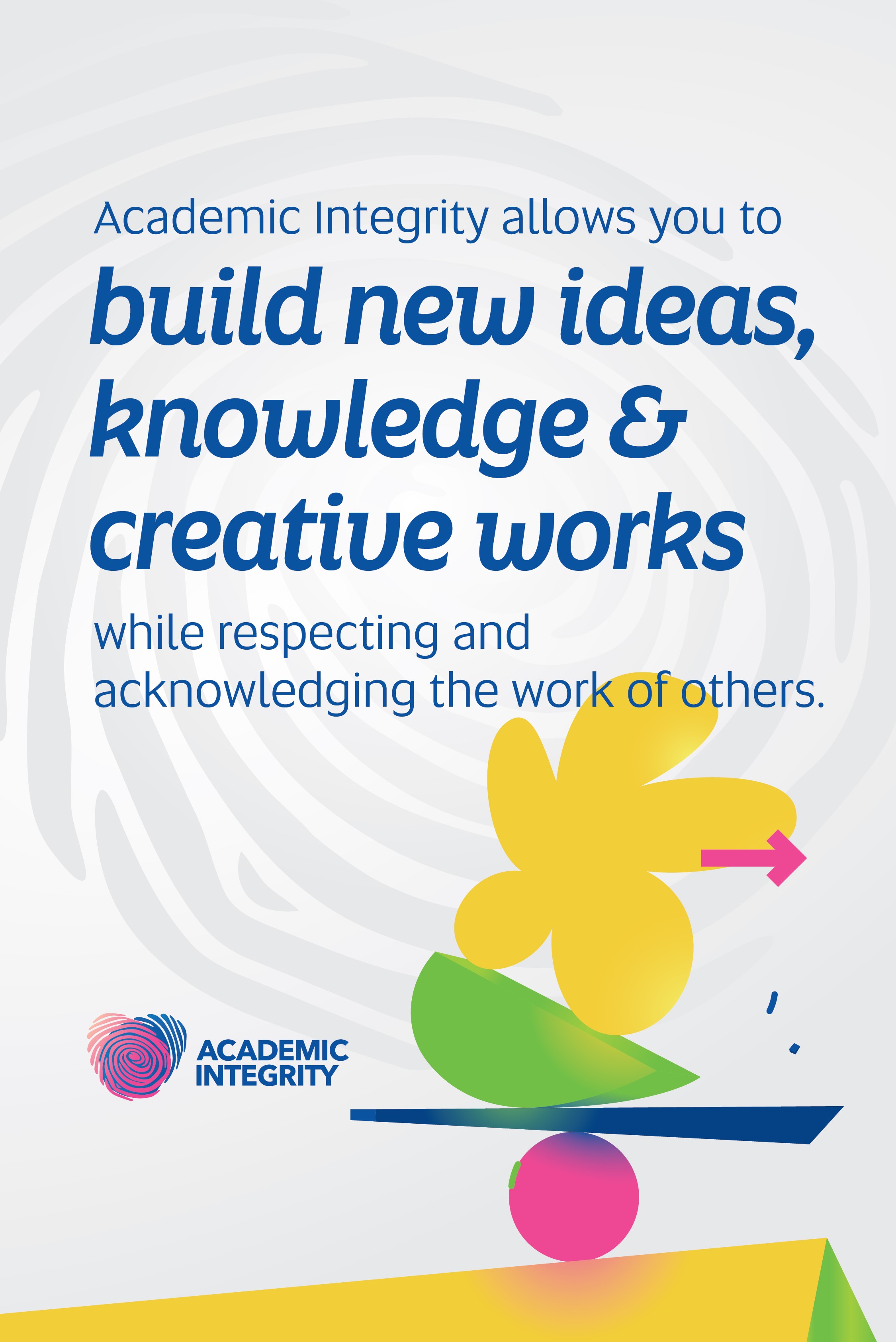
Using Artificial Intelligence
Academic misconduct includes "presenting and/or submitting academic work for assessment or review produced through generative artificial intelligence tools" (University of South Australia, 2023, p. 2).
You should not use artificial intelligence software or paraphrasing tools in order to produce an assignment for assessment, unless permitted to do so. Any work you submit must be your own and should not be produced using software devices as a form of cheating.
Watch the video (5 mins 45 secs) below to find out more about generative artificial intelligence and how it can be used:
Further advice on student use of artificial intelligence at university can be found here.
Collusion
Collusion is defined as "any unauthorized collaboration in preparation or presentation of work, including knowingly allowing personal work to be copied by others" (University of South Australia, 2023, p. 2).
The work you submit should be your own and you should complete it individually unless specific instructions require you to work with others. It is ok to discuss ideas and concepts from your course with other students (e.g. as you may do in tutorials or other classes), but you should not receive or provide assistance for assessments. To avoid colluding with others, work on your own assessment tasks and avoid sharing any work that is for graded assessment with others. For more examples of collusion refer to the chapters on Providing significant assistance and File sharing.
What should Jack do?
Jack has joined an online study group and has noticed that everybody is uploading their drafts to help each other out. Should Jack upload his draft too? And should he be using other people's work to inform his own writing? Watch the video to hear what other UniSA students think and the advice they'd give Jack.
(Video length: 1 minute, 24 seconds)
Contract cheating
Contract cheating is defined as the "outsourcing of assessments to a third party, whether that is a commercial provider, or a non-commercial provider such as a current or former student, family member, or acquaintance" (University of South Australia, 2023, p. 2).
All work that you submit for assessment must be done by you. Paying for or getting another person or organisation to do an assessment and submitting as your own work is serious academic misconduct. It is also a criminal offence for any person to provide or advertise this service to others in Australia.
What should Hannah do?
Hannah is having trouble with an assignment, and the deadline is in two days. She has seen a post on social media for a service that does assignments for a small fee. Should she use the service? Watch the video to hear what other UniSA students think and the advice they'd give Hannah.
(Video length: 1 minute, 30 seconds)
Risks of contract cheating
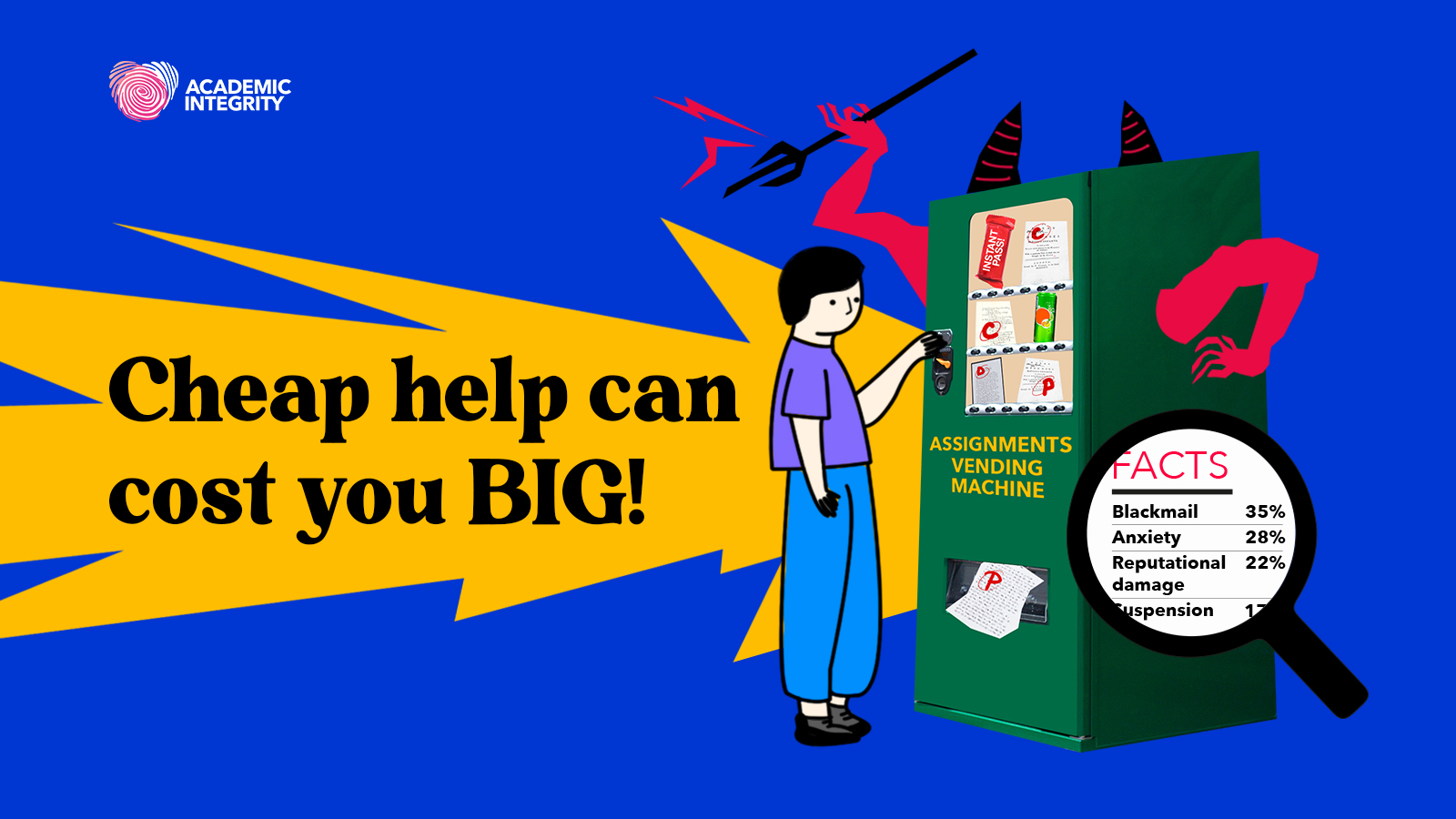
While there are legitimate services out there like Studiosity which provide educational and ethical academic study support, many are illegal cheating services which engage in contract cheating and at times, blackmail. It is important for your academic, social, financial and emotional wellbeing that you are aware of these illegal services and report them if they contact you.
Visit TEQSA to learn more about identifying and reporting illegal cheating services and the eSafetyCommissioner online scams page to find out how to protect yourself.
Student support at UniSA is FREE!
- Talk to a Learning Adviser for tips to improve time management and academic skills.
- Talk to a Counsellor if experiencing personal issues which impact your studies.
- Have you been scammed or blackmailed by an illegal contracting cheating service? Please reach out to someone.
- Book an appointment with a Counsellor for wellbeing support
- Meet with a USASA Financial Counsellor for financial guidance
- Seeking study support, but not sure what help you need? Ask Campus Central and they'll point you in the right direction.
File sharing
File sharing is seen "as a form of academic misconduct, e.g. exchange of exam questions or assignments with other students, or uploading assignments or exam questions to online file sharing sites or study sites" (University of South Australia, 2023, p. 3).
You should not share your assessment drafts or files of work with any other students, and you should not request another student to share their work with you. This includes via chat, messaging, any other tool online or in person, on paper or any other means to share information.
Providing significant assistance
Academic misconduct includes "providing significant assistance to a student in the completion and/or presentation of their academic work" (University of South Australia, 2023, p. 3).
It is unacceptable for you to provide significant assistance to other students to complete their assignments.
While it is acceptable to talk to your fellow students and give them advice, you must not write, rewrite or produce any part of their assignment. If you do, you will have committed misconduct because you provided significant assistance where it was not permitted. They will also be guilty of misconduct because the work they submit will not be entirely their own.
- Do not help to write, rewrite or produce another student's assignment
- Do not allow another student to read or copy your assignment in either paper or electronic format.
Assistance for assignments does not only relate to writing, but can include solving problems, doing calculations, writing computer code, and designing creative work and images. However, if your course outline states that the assignment is a group task which requires input from the group members then collaboration is acceptable.
While it is acceptable to ask someone to read your work and provide feedback, it is unacceptable for them to provide feedback to such an extent that they are rewriting your assignment. The picture below illustrates the differences between acceptable feedback, such as pointing out simple grammar and expression errors and providing suggestions to make meaning clearer, and unacceptable feedback, which involves significant rewriting of material by the reader.
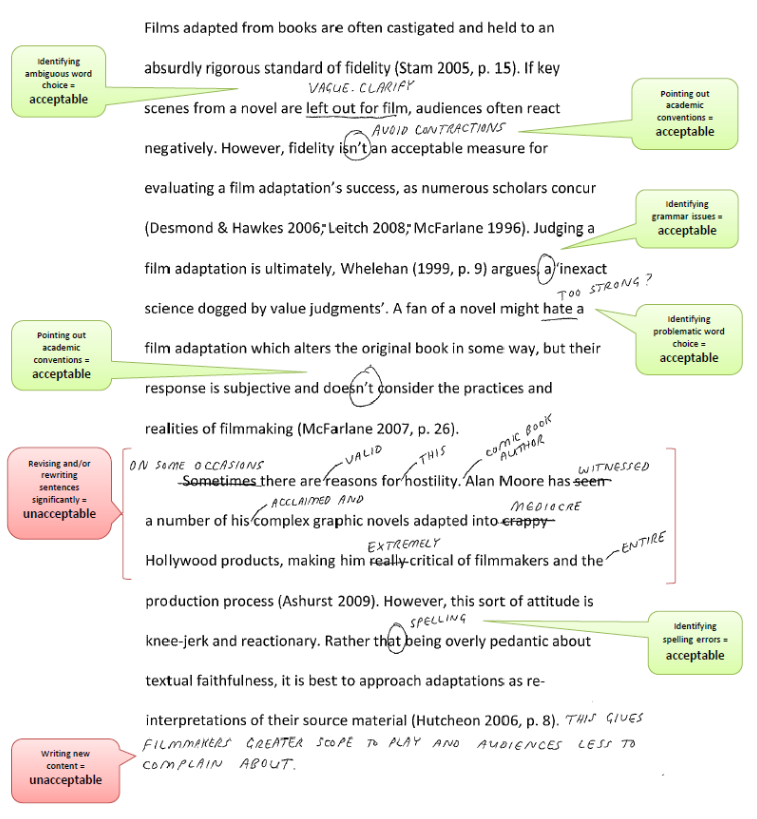
Fabricating or falsifying information
Academic misconduct includes "fabrication or falsification of information or student identity" (University of South Australia, 2023, p. 3).
Tampering with academic records or any other official documents is an act of academic misconduct. This includes forging, changing, or adapting the details of documents, including medical certificates, and presenting them to staff.
- Ensure all documents submitted to the university are authentic.

Offering or accepting bribes
Academic misconduct includes "offering or accepting bribes for potential academic gain" (University of South Australia, 2023, p. 3).
Academic Integrity Officer Meeting - what to expect
Have you been contacted by an Academic Integrity Officer (AIO) regarding potential academic misconduct? Watch this video which explains what to expect.
(Video length: 2 minutes, 40 seconds)
Outcomes from the Academic Integrity Officer meeting may include:
- no academic misconduct involved (further education may be provided)
- a warning (no penalty applied)
- requirement to complete a learning module
- requirement to resubmit the assignment with revised referencing and paraphrasing
- a penalty less serious than zero grade for the assignment
- a zero grade for the assignment
- referral to Executive Dean, or delegate, who will initiate a formal inquiry.
Note that outcomes may vary and increase based on the severity and frequency of the misconduct. There are also consequences if you breach exam procedures. For further information on the process and outcomes, see UniSA's AB-69 P1 Academic Integrity procedure (University of South Australia, 2023).
USASA, the UniSA Students' Association, has Student Advocates whose roles are to advise students of their rights and support them throughout this process. There is also an Appeals process which you can explore.
Other Academic Integrity tips and resources
As discussed in this module, acting with academic integrity at university means acting with respect, honesty, trust, fairness, responsibility and courage. Simple ways to do this include:
![]() referencing the sources of information and ideas in your assignments
referencing the sources of information and ideas in your assignments
![]() paraphrasing other people's work and ideas while still referencing the source
paraphrasing other people's work and ideas while still referencing the source
![]() completing your own work independently
completing your own work independently
![]() behaving honestly in exams, assignments, and other types of academic work.
behaving honestly in exams, assignments, and other types of academic work.
Referencing is an important tool for academic integrity and avoiding plagiarism. Actions you can take to ensure you reference correctly include:
![]() putting ideas and information in your own words while doing research
putting ideas and information in your own words while doing research
![]() recording your sources' authorship and publication details
recording your sources' authorship and publication details
![]() finding out which referencing style you need to use and learning its rules
finding out which referencing style you need to use and learning its rules
![]() inserting references into your work as you write
inserting references into your work as you write
![]() using Turnitin to check for similarity of your work to other sources
using Turnitin to check for similarity of your work to other sources
![]() learning more about referencing and paraphrasing elsewhere on this website
learning more about referencing and paraphrasing elsewhere on this website
![]() attending online academic skills workshops
attending online academic skills workshops
![]() booking an appointment with a Learning Adviser.
booking an appointment with a Learning Adviser.
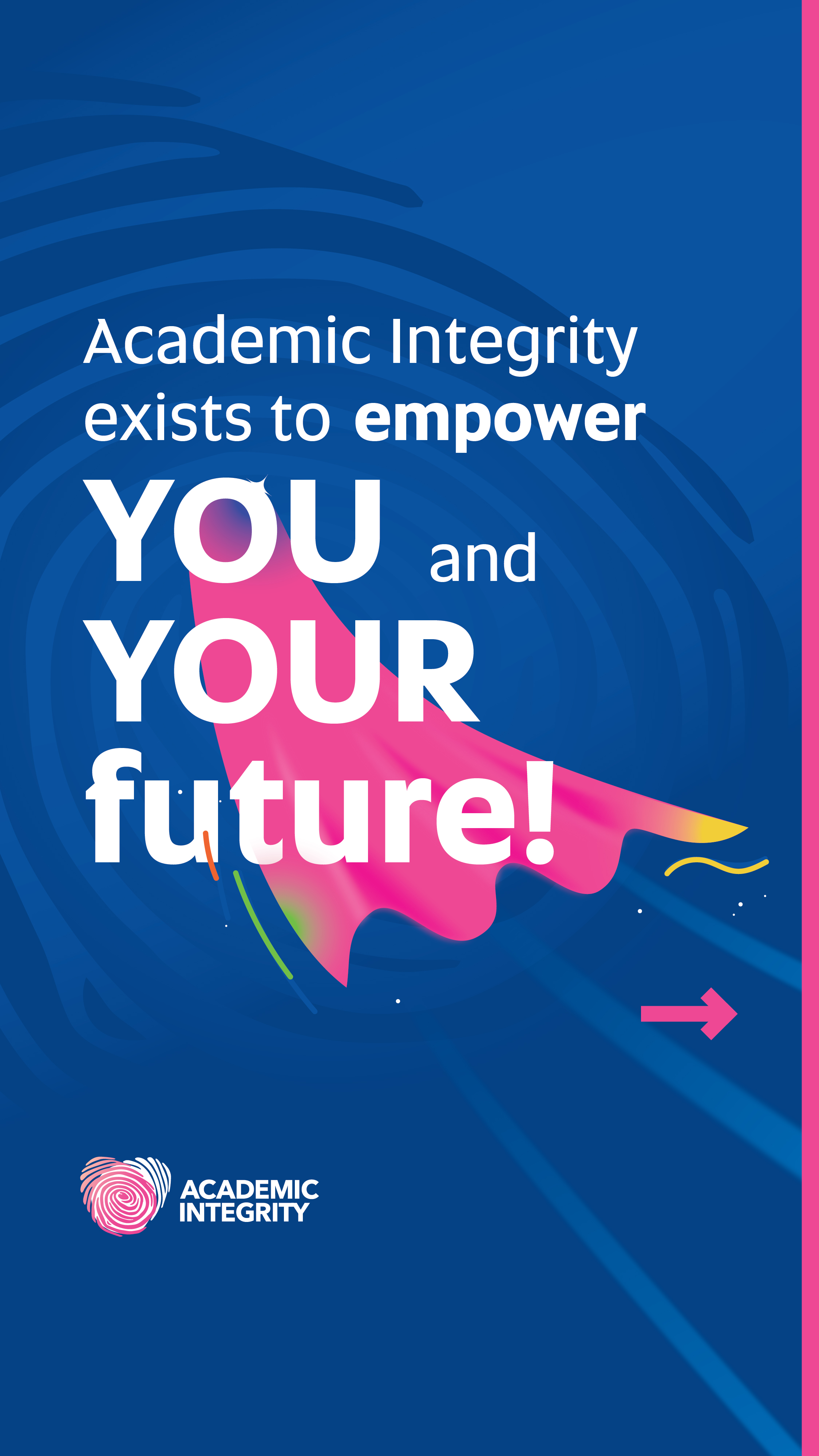
Academic Integrity Quiz
 Check your knowledge about Academic Integrity
Check your knowledge about Academic Integrity
- Once you have completed the Academic Integrity module, test your knowledge by doing the quiz below.
- There are 11 questions in this quiz. You must answer 9 out of 11 questions correctly for this quiz to be considered complete and to access the Completion Certificate tool to view and generate your certificate of completion (see next page).
- When you have answered all questions, click 'Finish' to see your result and the correct answers.
- You can attempt the quiz more than once if you want to review, practise and improve your understanding.
- If you do not understand the quiz questions and/or answers, click here to book an appointment with a Learning Adviser. Bring your questions and your quiz results to the appointment.
Print Your Certificate
For this module to be considered complete, you must score at least 9/11 on the quiz, and then access and generate your Completion Certificate.
So, once you have completed the quiz and received at least 9/11 - return to the Academic Integrity Module tab in the menu where you can view the link to the Certificate tool.